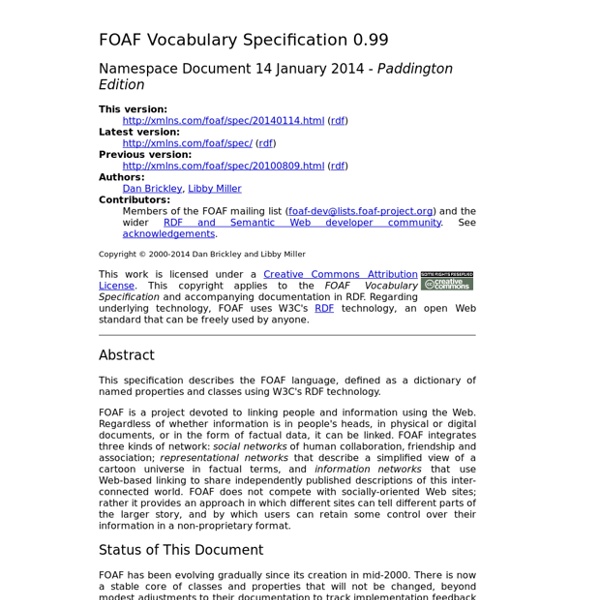Whitepaper: The ClioPatria Semantic Web server
What is ClioPatria? ClioPatria is a (SWI-)Prolog hosted HTTP application-server with libraries for Semantic Web reasoning and a set of JavaScript libraries for presenting results in a browser. Another way to describe ClioPatria is as Tomcat+Sesame (or Jena) with additional reasoning libraries in Prolog, completed by JavaScript presentation components''. Why is ClioPatria based on Prolog? Prolog is a logic-based language using a simple depth-first resolution strategy (SLD resolution).
BIO: A vocabulary for biographical information
Creators David Galbraith This document describes a vocabulary for describing biographical information about people, both living and dead. The BIO vocabulary contains terms useful for finding out more about people and their backgrounds and has some cross-over into genealogical information. The approach taken is to describe a person's life as a series of interconnected key events, around which other information can be woven.
Wave - Welcome to Apache Wave (incubating)
Wave is a distributed, near-real-time, rich collaboration platform that allows users to work together in new and exciting ways. Wave allows for flexible modes of communication, blending chat, email and collaborative document editing in to one seamless environment. Wave provides a lively and responsive environment that promotes more fluid and dynamic collaboration between users. The addition of Robots and Gagets allow the Wave platform to provide intelligence, integration, and customizability to the users experience. Currently, the main focus of the Apache Wave project is the development of "Wave in a Box" (WiaB).
Applying SKOS Concept Schemes
Lightweight Blog Category Schemes One place where you can imagine this being useful is in the categorization of blogs and blog entries. It would be great to categorize your own blogs and entries topically in a lightweight, but formal way. People tend to use simple tags at the moment, but tags alone are insufficient. As easy as the folksonomic approach is, it is too hard to link across blogs and reuse the topics when they are unbound.
Knowledge Representation and Reasoning Group - News and Updates on the KRR Group
RELATIONSHIP: A vocabulary for describing relationships between people
Creators Eric Vitiello Jr A vocabulary for describing relationships between people Please direct feedback on this document to the FOAF-DEV mailing list History 2004-02-11 - first issued2005-08-10 - editorial change by Ian Davis: Added isDefinedBy properties and updated documentation2009-05-15 - semantic change by Ian Davis: Typed vocabulary as owl:Ontology2010-02-09 - semantic change by Ian Davis: Asserted that foaf:knows is rdfs:subPropertyOf rel:knowsOf2010-02-09 - semantic change by Ian Davis: Incorporated changes suggested by Henry Story on foaf-dev list2010-04-19 - editorial change by Ian Davis: Inlined the examples that had been orphaned by publishing software changes
Quickstart - GoodRelations Wiki
Web Shop Software For many popular shop applications (e.g. Magento, Joomla/Virtuemart, Wordpress/WPEC,...), there exist free extension modules that make adding GoodRelations RDFa for semantic SEO as easy as a few mouse-clicks. That is by far the simplest way of adding GoodRelations to your site, so make sure you check the current list of available modules first. If your software package is not listed there, you can: Ask your vendor to add GoodRelations using this recipe.
Schemapedia



